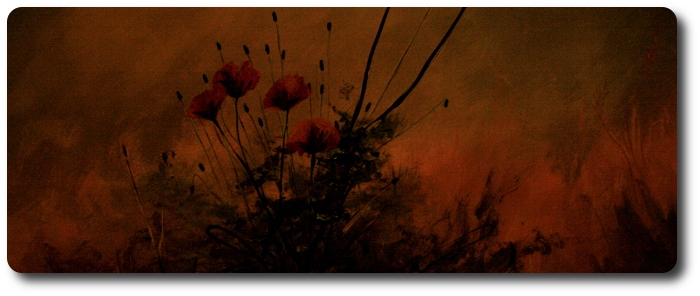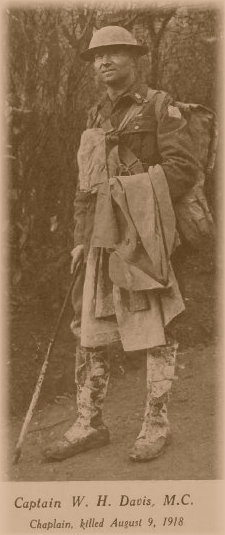Topic: CEF

"Hope" (cropped from full image) by Keri Orozco.
A Padre in No-Man's-Land; "The Little Armistice"
Gregory Clark, "The Little Armistice," The Legionary, 1937; republished in "My Grandfather's War; Canadians Remember the First World War, 1914-1918," William D. Mathieson, 1981
 But the little armistice that fewer than a thousand Canadians and Germans saw was staged by only one man.
But the little armistice that fewer than a thousand Canadians and Germans saw was staged by only one man.
It lasted 30 minutes. But this one man, with his pallid face and his blue chin, had something. Joshua made the sun stand still on Gibeon. This one man made the battle of Passchendaele stand still. And because what he had, all men may have, and what he did, any man may do, I would like to tell the tale.
The fury began to grow again. Now began the worse part of the battle, the holding.
It was about 3 p.m. that he was first noticed.
A familiar figure. Sturdy, his helmet tilted curiously forward over his eyes.
He was surely the unlikeliest figure to be expected in such a place, in such a bloody slime and sea. He should have been back at the wagon lines, on the Canal Bank, in far-off Ypres. He was the padre.
Dramatize padres as we may have done, the fact remains that the normal place to look for a chaplain is not in the middle of a battle. In the front, frequently, yes. But this 4th C.M.R. Chaplain, the Rev. W. H. Davis, formerly of Shellbrook, Saskatchewan, was a little odd. He more or less lived in the front line.
And here he was about 3 p.m. of the afternoon, floundering around right in the open, in full view of the enemy, in advance of the newly established line, acting in a very queer manner.
He had a handkerchief tied to his walking stick. Padres are not allowed to bear arms, by international law. Holding his stick up and waving it every time a blast of fire came near him, he went plunging about, bending and straightening, and stabbing rifles into the mud. If it was a German wounded, he hung a German helmet on the gun bun. If a Canadian, a Canadian helmet.
Men shouted to him to come in out of that. The heavens were about to break. Aye, they were, in a funny way.
Serenely, the padre continued to quarter the dreadful ground this way, that way, while the crumps hurled in and the machine-guns stuttered and filled the air with their stomach-turning zipp and whisper.
One major caught the padre's ear. Through the crumps the padre waded over.
"I was getting anxious about you!" the major cried.
They held him there a little while until, unnoticed, he slipped away and appeared, far to the right, dipping and floundering, and setting up that ever-growing ragged chain of rifle butts, helmets aloft.
Small parties of his own men tried to reach him or to carry in one of the wounded he marked. But they were flattened with enemy machine-gun fire. The padre beckoned nobody. He called no man, Canadian or German, though he passed close to both. He simply stuck up the rifles, hung the helmets, and left them mutely there.
Then the heavens opened. But with silence. Shellfire ceased. Machine-guns died, all across that narrow C.M.R. belt. To north, to south, the fury raged. But out from this solitary figure, resolu tely plowing his zig-zag course in horror, there radiated a queer paralysis.
In a matter of minutes, silence grew. It was as if the sun stood still. As if the whole mad world were abashed. And there, all alone, in the middle of the silence, walked the solitary figure, bending, rising and stabbing rifles into the earth.
From the Canadian side figures crouched up, ventured forward. From the German side men rose. Where an instant before had been a 3-year-old hate, men were cautiously advancing, empty- handed, to meet one another. They ran to their own markers, the helmets, German or Canadian. Some of the wounded Canucks were far over amidst the Germans. Some of the wounded Germans lay back of the Canadian outposts. Canadians began to carry the Germans forward.
Padre Davis went and stood on The ruined remnants of a pill box, a few vast hunks of concrete. Aloft, he stood and beckoned the parties to him. He had established a clearing house. They traded wounded. Cigarettes were offered.
For nearly 30 minutes this armistice maintained. Then, a mile away, some artillery observing officer, through his glasses, beheld the target. He could make out enemy uniforms. Clustered, right in the open. What folly.
Shells came whistling. The silence vanished in a rising mutter. In three minutes the whole dreadful business was in full roar again.
They pinned on Rev. Davis the M.C. when he arrived back. They ordered him to sty behind at the wagon lines but later, while leading stretcher-bearers during a battle, he was struck by a shell. He was buried in Le Quesnel Cemetery.

